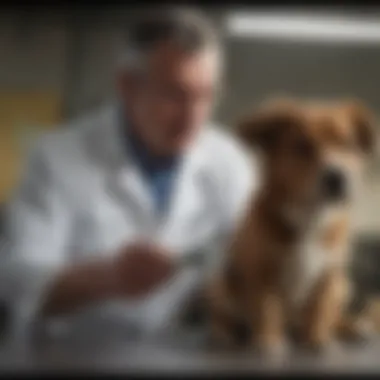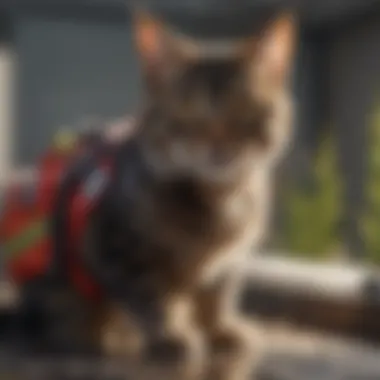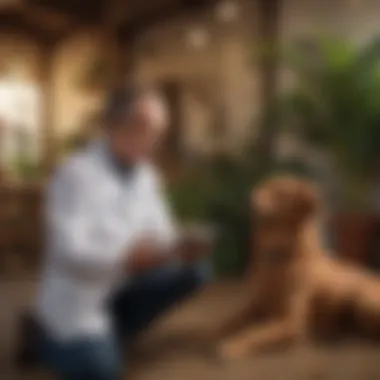Comprehensive Insights into Palm Valley Vet Services


Intro
In a world where pets are viewed as family, the need for comprehensive veterinary services has never been more apparent. Palm Valley Vet stands as a beacon of animal health care, providing essential and specialized services to meet the varied needs of pet owners. This article aims to combine insights into veterinary practices and the ever-evolving landscape of animal medical care, shedding light on the importance of routine check-ups, emergency services, and preventative measures.
As we progress through the different aspects of Palm Valley Vet services, we will explore not only the technicalities of veterinary care but also the responsibilities that pet owners bear. Understanding the role of veterinary services helps enhance the bond between humans and their pets, ensuring better health and well-being.
Research and Data Analysis
The veterinary field is grounded in continuous research and data analysis. This informs best practices and aids in the development of innovative treatment options. At Palm Valley Vet, access to the latest data ensures that the services offered are not only current but also rooted in scientifically proven methods.
Latest Trends in Veterinary Services
Recent trends show a significant shift towards integrating technology in veterinary care. Tele-veterinary services have gained traction, allowing for remote consultations, which is especially beneficial for minor concerns. This trend minimizes discomfort for pets and enhances convenience for busy pet owners.
Another trend includes an emphasis on preventative care. Routine check-ups, vaccinations, and early disease detection are pivotal in maintaining the health of pets. These proactive measures lead to a longer, healthier life for animals, and they ultimately save money for pet owners by avoiding costly emergency interventions later.
Statistical Insights into Animal Health Care
Statistical evidence suggests that pets receiving routine vaccinations are 50% less likely to contract common diseases. Regular health check-ups have shown to reduce the risk of severe illnesses, proving the adage "prevention is better than cure" to ring true.
To ensure optimal animal care, pet owners should prioritize regular veterinary visits, even when their pets appear healthy.
Best Practices and Techniques
Adopting best practices in veterinary care is essential for ensuring high-quality services and effective treatment. Palm Valley Vet implements a set of techniques focused on enhancing the health infrastructure for animals.
Efficient Care Strategies
One notable strategy is the tailored approach to each animal's needs, recognizing that every pet is unique. This includes diagnostic testing that is appropriate for their age, breed, and health history. Such personalized attention ensures timely interventions and enhances the overall effectiveness of treatment.
Sustainable Veterinary Practices
Sustainability in veterinary practices is increasingly important. Palm Valley Vet advocates for sustainable methods, emphasizing the reduction of waste in their facilities and responsible medical waste disposal practices. This approach aligns with global efforts toward environmental conservation while maintaining animal well-being.
Emergency Services
Emergency veterinary care is a crucial component of pet health. Palm Valley Vet is equipped to handle various urgent situations, from accidents to sudden health crises. Quick access to emergency services can mean the difference between life and death for pets.
Common Emergencies
While every situation is distinct, some common emergencies include:
- Road accidents
- Toxin ingestion
- Severe allergic reactions
- Respiratory distress
It's imperative for pet owners to remain vigilant about potential hazards in their pets' environment. Recognizing the signs of distress can prompt timely intervention.
End
For more information on veterinary services and advancements in this field, interested readers can explore resources at Wikipedia and Britannica.
Ultimately, informed pet owners contribute to a healthier pet community.
Understanding Veterinary Medicine in Palm Valley
Veterinary medicine plays a critical role in the care and well-being of animals in Palm Valley. Each pet's health is intertwined with the community's overall health, making it essential to understand veterinary services. This knowledge empowers pet owners to take proactive measures in their animals' welfare and fosters better communication with veterinary professionals. In a landscape constantly evolving with advancements and new practices, being informed is crucial for making sound health decisions.
Overview of Veterinary Services
Palm Valley Vet offers a comprehensive range of services focused on both preventive care and urgent interventions. This includes routine check-ups, emergency services, and specialized care catering to various animal needs. Understanding these services allows pet owners to better navigate their pets' medical requirements.
Here are some key veterinary services provided:
- Routine Check-ups: Regular wellness visits help identify potential health issues early.
- Emergency Care: Urgent situations demand immediate attention, and knowing when to seek help is vital.
- Surgical Services: Many ailments require surgical intervention, from non-invasive procedures to complex surgeries.
- Dental Care: Oral health is often overlooked but is essential for overall well-being.
- Vaccination Programs: Staying current on vaccines helps combat preventable diseases.
Each of these services is designed to address the diverse health needs of animals, ensuring they lead healthy, fulfilling lives. The veterinary professionals at Palm Valley Vet are equipped with the expertise and tools to address unique challenges that may arise. For instance, a new pet owner might feel overwhelmed by the extensive vaccination schedule. Engaging with the veterinary team ensures clarity and guidance in this critical matter, fostering a better understanding of the health needs of their pet.
"Veterinary services extend beyond medical treatment; they are an integral part of responsible pet ownership."
Core Services Offered by Palm Valley Vet
Palm Valley Vet provides a comprehensive array of services that are crucial for maintaining the health and wellbeing of pets. Each service aims to address specific needs that animals may have throughout their lives. Understanding these core services helps pet owners make informed decisions about the care their pets receive. The importance of these services cannot be overstated, as they contribute to the overall health and longevity of pets.
Routine Check-ups and Preventative Care
Routine check-ups are essential for catching health issues before they become serious. During these visits, veterinarians perform comprehensive physical examinations, assess the pet's weight, and check for signs of disease or discomfort. Regular check-ups lead to early detection of potential health problems, which can result in more effective treatments and better outcomes. For instance, a small dental issue caught early can prevent the need for more extensive dental surgery later on.
Additionally, preventative care encompasses vaccinations, parasite control, and nutritional advice, which are all pivotal in maintaining a healthy lifestyle for pets.
Surgical Services
Surgical services at Palm Valley Vet include a range of procedures, from routine spaying and neutering to complex surgeries that address serious health conditions. The surgical team uses advanced techniques and protocols to ensure the safety and comfort of pets undergoing surgery. It is important for pet owners to understand the need for surgical interventions, as these procedures can significantly improve a pet's quality of life. Some conditions may be painful or debilitating if not treated correctly through surgery.
Emergency Care Services


Emergencies can strike without warning. Palm Valley Vet is equipped to handle urgent medical situations, providing critical care when pets need it most. Understanding when to seek emergency care is vital. Common situations include difficulty breathing, severe vomiting, or signs of trauma. Immediate medical attention can be life-saving, and knowing the available emergency services gives pet owners peace of mind in crisis.
Dental Care
Dental health is frequently overlooked but is hugely important. Poor dental hygiene can lead to serious health issues, including heart and kidney problems. At Palm Valley Vet, various dental services are offered, including cleanings, extractions, and preventative care to keep teeth and gums healthy. Regular dental check-ups help in preventing bad breath, gum disease, and tooth loss, making it essential for pet owners to prioritize this aspect of their pet's health.
Vaccination Programs
Vaccination programs help protect pets from various infectious diseases that can be severe or even fatal. Palm Valley Vet offers tailored vaccination schedules based on the pet’s lifestyle and health history. This individual approach ensures that pets receive the necessary vaccinations to keep them safe and healthy. Furthermore, typically, vaccination not only protects the vaccinated animal but also helps prevent the spread of disease to other pets.
Each of these service areas functions together, forming a comprehensive approach to veterinary care that emphasizes not just treatment but holistic wellbeing for pets throughout their lives. Engaging continually with these core services ensures that pets remain healthy, allowing them to live long and fulfilling lives.
Specialized Veterinary Care at Palm Valley
Specialized veterinary care plays a crucial role in the overall health and wellbeing of pets in Palm Valley. It extends beyond routine services, targeting specific health issues and enhancing the quality of life for animals. The importance of specialized veterinary care lies in its ability to provide tailored treatment plans that address unique pet needs. This approach often involves additional training for veterinarians and more advanced medical equipment.
Specialized care includes different areas, such as nutritional counseling and behavioral consultations. These services help in managing specific conditions, guiding pet owners in making informed decisions for their pets’ health.
Nutritional Counseling
Nutritional counseling is a vital component of specialized veterinary care. Pets, much like humans, require balanced diets to maintain their health. A proper diet supports growth, immunity, and overall vitality. Veterinarians trained in nutritional counseling can analyze a pet's dietary needs and recommend changes based on individual health goals.
- Preventing Obesity: In Palm Valley, obesity can be a significant concern. Veterinarians help devise meal plans that prevent excess weight gain. They educate pet owners about proper portion sizes, healthy treats, and meal timing.
- Allergy Management: Some pets suffer from food allergies. Nutritional consultation assists owners in identifying problematic ingredients. Appropriate substitutes can lead to improved health outcomes.
- Life Stage Considerations: Nutrition needs differ with age. Puppies, adult dogs, and senior pets have distinct requirements. Specialized dietary advice ensures that pets receive appropriate nutrition for their life stage.
"Consulting with a veterinarian about dietary needs can lead to significant improvements in a pet's overall health."
Behavioral Consultation
Behavioral consultation is another facet of specialized care that addresses the mental health of pets. Behavior issues can lead to stress for both animals and their owners. Understanding these concerns can foster a better pet-owner relationship.
- Identifying Problem Behaviors: Issues such as excessive barking, scratching, or aggression can be distressing. Behavior consultations help identify triggers and develop strategies to mitigate these problems.
- Training Support: A key part of behavioral consultation involves training. Pet owners learn effective training techniques to modify undesirable behaviors. This can include socializing pets or reinforcing good conduct through positive reinforcement.
- Stress Management: Just as physical health is important, mental wellbeing is crucial for a pet’s quality of life. Veterinarians work with owners to recognize stress signs and suggest environmental adjustments.
In summary, specialized veterinary care, including nutritional counseling and behavioral consultation, ensures that pets at Palm Valley receive well-rounded services. This specialized focus not only fosters better health outcomes but also enhances the relationship between pets and their owners.
The Importance of Routine Care
Routine care is a critical aspect of veterinary practice. Regular visits to the vet play a vital role in maintaining the health and well-being of pets. Not only does routine care help detect potential health issues early, but it also creates an opportunity for preventative measures. This approach can lead to a longer, healthier life for pets, making it essential for responsible pet ownership.
Benefits of Regular Veterinary Visits
Visiting a veterinarian regularly provides various benefits:
- Early Detection of Health Problems: Routine check-ups allow for early identification of various issues, such as dental disease, heart conditions, or skin problems. This early detection often results in a better prognosis and more treatment options.
- Preventative Care: Preventative treatments, including vaccinations and parasite control, are essential components of routine care. They safeguard pets from illnesses that can be costly and harmful if left untreated.
- Behavioral Insights: Regular visits give veterinarians a chance to observe a pet’s overall demeanor and behavior. They can offer recommendations on training and socialization, addressing concerns before they become serious.
- Nutritional Guidance: Routine consultations often include discussions about diet and nutrition. Vets can help pet owners make informed decisions about what to feed their pets, which can significantly impact their health.
- Building a Relationship: Regular visits build a trusting relationship between the veterinarian and the pet owner. Over time, a vet becomes familiar with a pet's medical history, making it easier to identify changes or issues.
"Routine veterinary visits are not just about treatment; they are about maintaining a sustainable health plan for your pet."
Additionally, routine care creates a platform for effective communication between pet owners and veterinary professionals. This communication becomes crucial during emergencies or when specific health concerns arise. As pet owners become more informed, they can take proactive steps in managing their pets’ health.
Emergencies: When to Seek Immediate Attention
Emergencies in veterinary care can arise without warning, making it essential for pet owners to recognize when immediate attention is necessary. The health and well-being of a pet can change dramatically in a short period. Timely intervention can mean the difference between life and death, or between recovery and long-term health issues.
Understanding the circumstances that warrant emergency veterinary care is crucial. Pets, like humans, can suffer from sudden illnesses or injuries needing swift treatment. Failure to respond quickly can lead to serious complications. Moreover, being aware of emergency situations helps pet owners make informed decisions, ensuring their beloved companions receive the care they need.
Benefits of Recognizing Emergency Situations
- Quick Response: Fast actions save lives.
- Informed Decisions: Understanding health issues empowers owners.
- Potential Cost Savings: Early treatment often reduces complications and further costs.
Consider this: emergency veterinary services are designed to handle critical situations. They offer specialized equipment and trained professionals that regular clinics typically don’t provide at all hours. Therefore, knowing when to utilize these services can safeguard your pet's health.
Common Emergency Situations
Identifying common emergency situations can prepare pet owners to act swiftly. Here are some scenarios that require immediate veterinary intervention:
- Difficulty Breathing: Struggling to breathe can indicate severe health problems.
- Severe Bleeding: Any significant blood loss needs urgent care.
- Ingestion of Poisonous Substances: Quickly addressing potential poisoning is vital.
- Unconsciousness or Seizures: Both symptoms indicate critical concerns.
- Signs of Pain or Distress: Excessive whining or unwillingness to move may indicate serious issues.
- Trauma: Injuries from accidents or fights need professional assessment.
- Vomiting or Diarrhea: Persistent vomiting or diarrhea, especially if it’s bloody, warrants immediate attention.
It's important for pet owners to act immediately when presented with these conditions. Delaying care poses risks not only to the health of the animal but can also lead to increased treatment costs later on.
Veterinary emergencies require a proactive approach; keeping the nearest emergency vet clinic's contact information handy can help significantly.
Pet Owner Responsibilities in Veterinary Care
Pet ownership is a significant commitment. Understanding pet health needs is crucial for the long-term well-being of animals. Responsible pet owners play a pivotal role in achieving this. The responsibility involves not just providing shelter and food, but also ensuring that pets receive proper veterinary care. This includes routine check-ups and timely vaccinations. Neglecting these aspects can lead to serious health issues for the animal, which can be preventable with appropriate care.
Understanding Pet Health Needs
To effectively care for a pet, owners must comprehend the specific health requirements of their animals. Each pet is an individual, with its own unique needs based on species, breed, age, and health condition.
- Regular Veterinary Visits: Pet owners should schedule annual or bi-annual check-ups. These visits allow veterinarians to evaluate pets, conduct necessary tests, and provide necessary vaccinations.
- Vaccination and Preventative Care: It is essential for pet owners to keep up with vaccination schedules recommended by veterinarians. Vaccinations protect against diseases that could otherwise be life-threatening.
- Nutrition: Understanding dietary needs is another important responsibility. An appropriate diet varies significantly between pets and can affect their overall health. Pet owners should consult their veterinarians regarding nutrition to ensure their pets are receiving balanced diets.
- Regular Exercise: Physical activity is essential for a pet's health. Regular exercise can prevent obesity and contribute to mental well-being. Pet owners should integrate exercise into their pets' daily routines.
- Behavior Monitoring: Responsible pet ownership includes being vigilant about behavioral changes. Any sudden changes can be indicative of underlying health problems that should be promptly addressed with a veterinarian.
- Environmental Awareness: Owners must provide a safe living environment. This includes removing hazards and ensuring that pets have access to clean, fresh water at all times.
"Understanding and fulfilling pet health needs lays the foundation for a happy, healthy life for pets and a fulfilling relationship between pets and their owners."


Community Engagement and Outreach Programs
Community engagement is crucial for veterinary practices like Palm Valley Vet. These programs foster relationships between veterinary staff and the local community, promoting animal health and well-being. Through outreach initiatives, Palm Valley Vet aims not only to provide veterinary care but also to enhance the knowledge and awareness of pet health among the public.
Engaging with the community serves multiple benefits:
- It builds trust and rapport, making pet owners more comfortable seeking veterinary advice.
- Education initiatives can lead to increased understanding of preventative care, benefiting both pets and their owners.
- Outreach can help address common misconceptions around animal care, thereby improving the overall health of the pet population.
- Collaboration with local organizations creates a stronger network for promoting responsible pet ownership, which is fundamental for community well-being.
Education Initiatives
Education initiatives form the backbone of community engagement efforts at Palm Valley Vet. They focus on disseminating important information about pet health, nutrition, and wellness to pet owners and the general public. Such initiatives might include:
- Workshops and Seminars: These events provide hands-on opportunities for pet owners to learn about various topics such as vaccinations, dietary needs, and behavioral training.
- School Programs: Collaborating with local schools, Palm Valley Vet can lead sessions that teach children the importance of animal care and responsibility. This cultivates a future generation of informed pet owners.
- Online Webinars: With technology's role in current society, virtual learning sessions allow pet owners to access crucial information from the comfort of their homes, broadening access.
"Engaging the public through education is essential for building a community that prioritizes the health and happiness of pets."
These programs not only equip pet owners with knowledge but also encourage them to take an active role in their pets' well-being. Palm Valley Vet's commitment to outreach reflects its understanding that an informed community results in healthier pets and strengthened relationships between pet owners and veterinary professionals.
Innovations in Veterinary Technology
Innovations in veterinary technology play a crucial role in shaping modern veterinary practices. These advancements aim to improve not only the efficiency of veterinary services but also enhance the quality of care pets receive. By leveraging new technologies, veterinarians can diagnose and treat conditions more effectively, ultimately benefiting both animals and their owners.
Telemedicine is one of the most significant innovations in this field. It allows pet owners to consult with veterinarians remotely, providing access to care that may not be possible in person. This is especially useful for those in remote areas or for those who have mobility issues. Telemedicine can reduce travel time and stress for both the pet and the owner.
Additionally, technological tools enable better data management and health monitoring. For instance, electronic health records make it easier to track a pet's medical history and vaccination records. Such systems can provide alerts for overdue vaccinations or required examinations, ensuring that no important details are missed.
Other key innovations include diagnostic imaging techniques and laboratory equipment that lead to quicker and more accurate diagnoses. Advanced imaging systems, such as digital radiography and ultrasound, allow veterinarians to view internal structures non-invasively. This can lead to faster treatments and better outcomes for sick pets.
"Technology is not just an add-on, but a necessity for modern veterinary medicine."
Despite these benefits, some considerations must be kept in mind. Veterinary practices must be mindful of data privacy and the security of sensitive health information. Training is also essential, as veterinarians need to be proficient in using these technologies to maximize their potential. Therefore, ongoing education and adaptation to new tools are vital for both practitioners and their staff.
Telemedicine in Veterinary Care
Telemedicine in veterinary care is an emerging trend that offers a range of advantages. It allows for virtual consultations, making it easier for pet owners to seek advice without the need for a physical visit. This can be especially beneficial in cases of mild illness or routine follow-up consultations.
Some of the benefits include:
- Convenience: Pet owners can consult from the comfort of their own home.
- Access: Helps those in remote areas get advice from specialists.
- Efficiency: Reduces the time spent in waiting rooms.
However, it is important to note that telemedicine is not suited for every situation. Serious medical emergencies require in-person evaluation and treatment. Establishing clear guidelines on when to use telemedicine is vital.
As technology continues to evolve, telemedicine is likely to become a standard practice in veterinary care, providing improved access and greater flexibility for pet owners.
Client Experience at Palm Valley Vet
When it comes to veterinary services, the client experience plays a crucial role in the overall efficacy of animal care. At Palm Valley Vet, this experience is tailored to meet the varied needs of pet owners. A focus on customer satisfaction not only enhances the well-being of pets but also fosters a strong community bond. Understanding how clients engage with the practice can significantly influence their trust in the veterinary team and the treatments provided.
Feedback Mechanisms
Feedback mechanisms are essential tools that Palm Valley Vet employs to ensure that the expectations of pet owners are met. By soliciting honest evaluations, the clinic can refine its services and better serve the community. This can take various forms, such as:
- Surveys: Both online and physical surveys after appointments allow clients to share their thoughts on their experiences, from waiting times to interactions with the staff.
- Reviews: Gathering and analyzing reviews on platforms like Facebook and Google provides insight into the general sentiments of clients regarding their services.
- Direct Communication: For immediate responses, Palm Valley Vet encourages clients to communicate directly with the staff. This approach helps in addressing concerns promptly and efficiently.
"Client feedback isn’t just about complaints; it’s also about praise that guides us to continue what we do well and improve upon areas that need attention."
Understanding the response and engagement level of the owners can reveal underlying trends in client satisfaction. This information guides operational decisions, enhances the quality of care provided, and shapes future offerings.
To summarize, establishing effective feedback mechanisms is integral to the client experience at Palm Valley Vet. It enhances transparency, improves service delivery, and ultimately fosters loyalty among pet owners. Selecting a veterinary service goes beyond the basic offerings; it encompasses the quality of care and the commitment to a positive client experience.
Government Regulations in Veterinary Practices
Government regulations are critical in the field of veterinary practices. These regulations ensure that animal health care is administered safely and effectively. They set a framework that professionals must follow to maintain high standards of care. Involving licensing and oversight helps protect animal welfare. Adhering to these rules also builds trust in the veterinary profession.
Licensing and Oversight
Licensing is a primary component of veterinary regulations. All veterinarians must obtain a license to practice. This requirement ensures that only qualified individuals can provide medical care to animals. Each state has its own board that governs licensing procedures. These boards establish criteria that include educational qualifications, examinations, and continuing education requirements.
Oversight also plays a significant role in maintaining quality in veterinary services. Regulatory bodies, such as veterinary medical boards, conduct inspections and investigations. They monitor compliance with standards set forth in legislation. These measures aim to uphold ethical practices and minimize malpractice.
Some key benefits of regulations include:
- Safety for Animals: Regulations help ensure that animals receive proper care and treatment.
- Professional Accountability: Licensing holds veterinarians accountable for their actions and decisions.
- Public Confidence: When owners know their vets are regulated, it increases trust in the veterinary profession.
"Regulations serve not just as guidelines but as a foundation for trust and accountability in animal health care.”
Proper knowledge of regulations is essential for both veterinarians and pet owners. Familiarity with these rules enables pet owners to make better-informed choices. Animals deserve competent care, and regulations play a vital role in providing that.
In summary, regulations in veterinary practices are essential for promoting high standards of animal health care. Licensing and oversight are key elements that enhance the professionalism in veterinary medicine.
Trends in Animal Health Care


The landscape of animal health care is constantly evolving. As pet owners become more informed and engaged, the demand for advanced veterinary practices increases. This is particularly true in Palm Valley, where the integration of new technologies and more sustainable practices influence veterinary services. Recognizing these trends is crucial for both veterinarians and pet owners.
One prominent trend is the growing focus on preventative care. This shift encourages regular check-ups to identify potential health issues before they escalate. Such proactive measures can lead to improved overall health for pets and can reduce long-term care costs for owners. By understanding the importance of routine veterinary visits, pet owners can contribute positively to their animals' health.
Another significant trend is the adoption of sustainable practices in veterinary medicine. More veterinary clinics, including Palm Valley Vet, are looking for ways to reduce their environmental impact. This includes using eco-friendly products, implementing efficient waste management systems, and sourcing sustainable materials for veterinary supplies. Pet owners increasingly appreciate clinics that incorporate these practices, aligning their values with those of their chosen veterinary services.
"The future of veterinary medicine hinges on a balance between high-quality care and environmental responsibility."
Furthermore, the incorporation of technology in veterinary care continues to shape trends. Telemedicine allows veterinarians to consult with pet owners remotely, which can facilitate faster responses to health issues and make it easier for pet owners to access services. This is particularly advantageous for those who live in remote areas or have limitations in mobility. The use of health tracking apps for pets is also on the rise, offering real-time data on their condition and behavior, all of which enhance the connection between pet owners and veterinarians.
The trend towards more integrated and holistic approaches in animal health is also noteworthy. This includes the growing recognition of mental and emotional health along with physical health in pets. Veterinarians are more often providing behavioral consultations that take into account the psychological factors affecting an animal’s well-being. By discussing both physical health and mental health together, pet owners gain a more comprehensive understanding of their animal’s overall health.
Understanding Pet Insurance
Pet insurance plays a crucial role in allowing pet owners to manage the financial aspects of veterinary care. With the increasing costs associated with veterinary services, having a pet insurance plan can provide peace of mind and significantly ease the burden when unexpected medical issues arise. This section will delve deeper into the importance of understanding pet insurance and what aspects are essential for pet owners to consider.
Evaluating Coverage Options
When considering pet insurance, evaluating coverage options becomes paramount. Different insurance companies offer various plans, which may include:
- Comprehensive Coverage: This typically covers accidents, illnesses, and preventive care, although this may come at a higher premium.
- Accident-Only Coverage: This plan focuses solely on accidents, helping offset higher costs when injuries occur.
- Wellness Plans: These plans cover routine care such as vaccinations and annual check-ups but may not support major health issues.
It's important to read the fine print concerning exclusions and limitations. For instance, most plans do not cover pre-existing conditions, so understanding what is and isn’t included is vital.
When comparing policies, look at key elements such as:
- Deductibles: The amount you must pay out-of-pocket before coverage kicks in.
- Reimbursement Levels: The percentage of the vet bill that the insurance will cover after the deductible is met.
- Annual Limits: Total payouts the insurance will provide for the year, which can affect serious health issues that might require ongoing treatment.
"Investing in pet insurance can be a smart decision for any pet owner, enabling access to better healthcare options without a financial strain."
Carefully assess the costs involved versus the potential benefits to ensure you choose a plan that fits your pet's needs and your budget. If possible, seek recommendations from other pet owners or consult with veterinarians who might have insights on which companies provide the best services and support.
The Relationship Between Veterinarians and Pet Owners
The bond between veterinarians and pet owners is a critical component of effective veterinary care. Understanding this relationship can enhance the overall health and well-being of pets. It is not merely about diagnosing and treating animals but involves nurturing an ongoing partnership. This collaboration leads to better health outcomes for pets and ensures that owners feel supported and informed.
The role of veterinarians extends beyond their technical expertise. They act as educators and advocates for animal welfare, providing crucial knowledge that pet owners need. When veterinarians take time to explain medical conditions, treatment options, and preventive care, pet owners can make informed decisions regarding their pets’ health.
Building Trust and Communication
Trust is the cornerstone of the veterinarian-pet owner relationship. A trusting environment allows pet owners to voice concerns and seek guidance without hesitation. In a situation involving complex or critical health issues, this trust is essential. When owners feel confident in their veterinarians' capabilities, they are more likely to follow through with recommendations for care.
Effective communication is also key. It is crucial for veterinarians to listen actively to concerns raised by pet owners and respond in a clear, empathetic manner. This two-way communication fosters understanding and strengthens the partnership.
In practical terms, building this relationship can involve:
- Regular Updates: Keeping pet owners informed about their pet’s health status during visits or through follow-up calls.
- Educational Resources: Sharing materials about proper pet care, common health issues, and advancements in veterinary medicine.
- Open Dialogue: Encouraging owners to ask questions, express fears, and discuss their expectations regarding treatment plans.
Veterinarians can also leverage technology to enhance communication. Utilizing platforms that allow for easy access to information can bridge gaps and create a seamless flow of information. Overall, the relationship paves the way for improved compliance with treatment plans, timely visits, and ultimately, healthier pets.
Veterinary Ethics and Best Practices
Veterinary ethics serves as a compass guiding the professional conduct of practitioners in the field. It emphasizes the necessity of maintaining professional integrity, ensuring the health and well-being of animals, and fostering trust between veterinarians and pet owners. In Palm Valley Vet Services, these principles are vital not only for ensuring compliance with regulations but also for enhancing the overall quality of care provided to animals.
Ethics in veterinary practice encompass several critical elements. Foremost is the commitment to animal welfare. Veterinarians at Palm Valley Vet must prioritize the best interest of the animals they treat. This involves making informed decisions that respect the needs and dignity of each pet, while also considering the wishes of the owner. In this arrangement, communication is crucial. Open dialogue about treatment options fosters a trusting relationship between the veterinarian and the pet owner. This interaction also allows for shared decision-making, enhancing adherence to recommended care plans.
Another key aspect of veterinary ethics is professional competence. Ongoing education is essential for veterinarians to stay current with the latest advancements in medical treatments, technologies, and established best practices. At Palm Valley Vet, the emphasis on continual learning is evident in their participation in workshops, seminars, and conferences. Practitioners who are well-informed can provide more accurate assessments and treatment options, which are fundamental in ensuring effective care.
Furthermore, honesty and transparency in communication enable veterinarians to set realistic expectations and avoid misunderstandings regarding treatment plans or costs. This approach builds lasting relationships and reduces the likelihood of disputes caused by misinformation. Pet owners who feel respected and well-informed are more likely to be compliant with treatment recommendations.
In addition to these principles, veterinary ethics also covers topics such as conflicts of interest and not disclosing personal grievances. Practitioners should focus solely on the well-being of the animal without letting personal biases influence their decisions. Such practices help maintain a professional standard that is in the best interest of all parties involved.
Ethical veterinary care is not just about following the rules, but about creating an environment of trust and compassion.
Professional Standards in Veterinary Care
Professional standards are the benchmark for the delivery of veterinary services. They are essential in establishing a framework that guides the everyday practices of veterinarians. In Palm Valley Vet, these standards are reflected in various areas, including patient care, communication, and business practices.
In terms of patient care, veterinary professionals are expected to apply their knowledge and skills competently. This includes performing accurate assessments, correctly diagnosing ailments, and recommending appropriate treatments. Regular participation in professional development further ensures that veterinarians remain informed and adept at dealing with emerging trends and challenges in veterinary medicine.
Moreover, effective communication with clients is a cornerstone of professional veterinary services. Practitioners should explain procedures, risks, and potential outcomes in a manner that is easily understandable to pet owners. This clarity not only enhances client confidence but also fosters a proactive approach to pet care.
To maintain the highest standards, all veterinary practices must also adhere to local and national regulations. Compliance with these standards protects both the animal patients and the veterinarians from potential liability.
Overall, the notion of professionalism in veterinary care extends beyond mere technical competence. It is about creating a service environment that respects and values both the client and their pets, ensuring an ethical and satisfactory experience for all.
Closure
In summation, the conclusion is essential in providing a comprehensive understanding of the various offerings and services discussed throughout this article on Palm Valley Vet. This section encapsulates the vital role that veterinary services play not only in the health of pets but also in fostering a strong bond between the pet owners and the veterinary professionals.
The significance of veterinary care is emphasized as a cornerstone of responsible pet ownership. Regular veterinary visits lead to early detection of potential health issues, ensuring the well-being of pets while providing peace of mind to their owners. Such proactive measures enhance the overall quality of life for animals.
Moreover, specialized services provided by Palm Valley Vet, including nutritional counseling and behavioral consultations, reflect the growing recognition of the complex needs of pets. Tailored care plans are critical in addressing these needs effectively. This fosters an environment where pet owners feel informed and empowered to make decisions for their furry companions, further enhancing the human-animal relationship.
"Proper veterinary care is not just a service; it's a commitment to our pets' well-being."
Additionally, the discussions on emergency care, preventative medicine, and the responsibilities of pet owners underscore a collaborative approach to pet health. Engaged pet owners willing to be proactive can significantly impact their pets' health outcomes.
Ultimately, this article serves as an enlightening guide for pet owners and enthusiasts. It articulates the multifaceted aspects of veterinary services at Palm Valley Vet, encouraging readers to prioritize and engage actively in their pets’ health care. The conclusion reiterates the importance of sustaining this knowledge for continuous improvement in animal health care practices.















